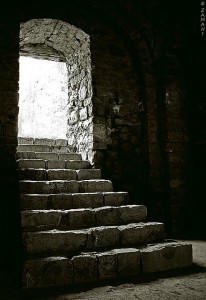
The thing that is different about being a Unitarian is that we are all on a spiritual journey – we don’t just find Unitarianism, and think “OK, that’s it, job done.” To quote the Unitarian leaflet A Faith Worth Thinking About, we believe that “everyone has the right to seek truth and meaning for themselves [and that] the fundamental tools for doing this are your own life-experience, your reflection upon it, your intuitive understanding and the promptings of your own conscience.” Each of us comes to Unitarianism from our own individual place, and we journey along together, feeding off each other’s ideas and inspirations and beliefs.
Like many Unitarians, I was not brought up in a Unitarian context, and spent my primary years at a little school, which held assembly every day. We followed the round of the Christian year, and sang all the lovely Christian hymns, without questioning their meaning.
It was not until I hit teenage years that the doubts began to kick in. I had never attended a mainstream Christian church (except at Christmas). Then I found out that several of my friends were being confirmed. So I started to investigate Christianity a bit more deeply. With some reluctance, I realised that there were many things about mainstream Christianity that I simply couldn’t go along with – original sin, the atonement, the divinity of Jesus, the 39 Articles to name but four. And yet I still believed in God.
At this point that I had a long conversation with my father, who had been brought up a Unitarian, but who had not attended church for many years. He explained that there was an alternative to mainstream Christianity, which didn’t involve outraging your common sense, or requiring you to suspend disbelief. He gave me a copy of Alfred Hall’s little book Beliefs of a Unitarian, and it had a profound effect on me. So this is what it’s all about, I thought.
Since then I have spent over 30 years on my spiritual journey, have listened to and read many wise words from fellow Unitarians, living and dead, and from them, and from my own life experience, have forged my own theology. It is a living and evolving thing – every time I hear or read something new that speaks to my condition, as the Quakers would say, I can reflect on it and incorporate it into my own spiritual beliefs. That freedom is precious.
Sue Woolley
How do you see?
How do you see?
Do you see with your eyes?
Do you notice the world that surrounds you?
Observe nature’s grandeur in sea, earth and sky,
look well at the beauty around you.
How do you see?
Do you see with your mind?
Can you picture a dream that dumbfounds you?
Then make that dream known to the whole of mankind,
the outcome may truly astound you.
How do you see?
Do you see with your heart?
Can you sense all the love that surrounds you?
Then feel all the kindness that others impart,
and pass it to people around you.
However you see,
with your heart, mind or eye,
let your vision form part of the rainbow
whose colours one day will become unified,
and truth will emerge from the shadow.
White truth will come out from the shadow.
Kath Forder, 2007
Pathways
Unitarianism is not a spiritual journey with a final destination; a journey along a known and well-used path. No, Unitarianism is instead an inner journey of self discovery and revelation. Discovering the power of love and human empathy, the balance of passion and reason; a sense of the divine in the commonplace.
Stephen Gutteridge, 2010
My Spiritual Journey
This started with my parents who went to a great deal of time and trouble to give me a loving, humanistic upbringing. However, you cannot possibly expect parents to do everything. I was honest, hard-working and conscientious, but I was also prone to temper, excessively task-focussed, rather self-absorbed andvery anxiety-prone. I was also very anti-religion because my parents were militant atheists.
However, I’ve always had a gut feeling that there is “Something Up There”. I would often get a sense of peace when I visited churches – strictly as a tourist of course!
I accompanied my husband to a conflict zone for two years. I met a couple of young British missionaries. They were good fun. I was a bored housewife wanting to practise. I started coming to their meetings, strictly for language learning purposes, of course!
I came to realise that thanks to those two missionaries, several students from the ranks of the post-conflict working poor were being cheered up and given something to live for. It did not matter whether all of it was true, so long as there was a kernel of truth in it. I therefore stopped thinking that all religion was a bad thing.
I returned home to my humanism. A few years later, after I had a very bad patch at work, my husband sent me to the Cheltenham Unitarian Church in the hope that it would help me, and because Unitarianism did not have the belief in the Crucifixion and the Atonement that had put me off mainstream Christianity.
At the same time, I had feedback from work that I often assumed that alternatives did not exist.
The Unitarian Church has provided alternatives to the cul de sac I was in. Through the sermons, hymns, discussions and fellowship, it has helped me to become a bit more of a lateral thinker, and to be a bit more naturally kind, rather than naturally conscientious. It is trying to carry out the main job of religion,which is to deliver you from evil in its widest sense. That is what really matters, the rest is the icing on the cake.
Lesley Harris